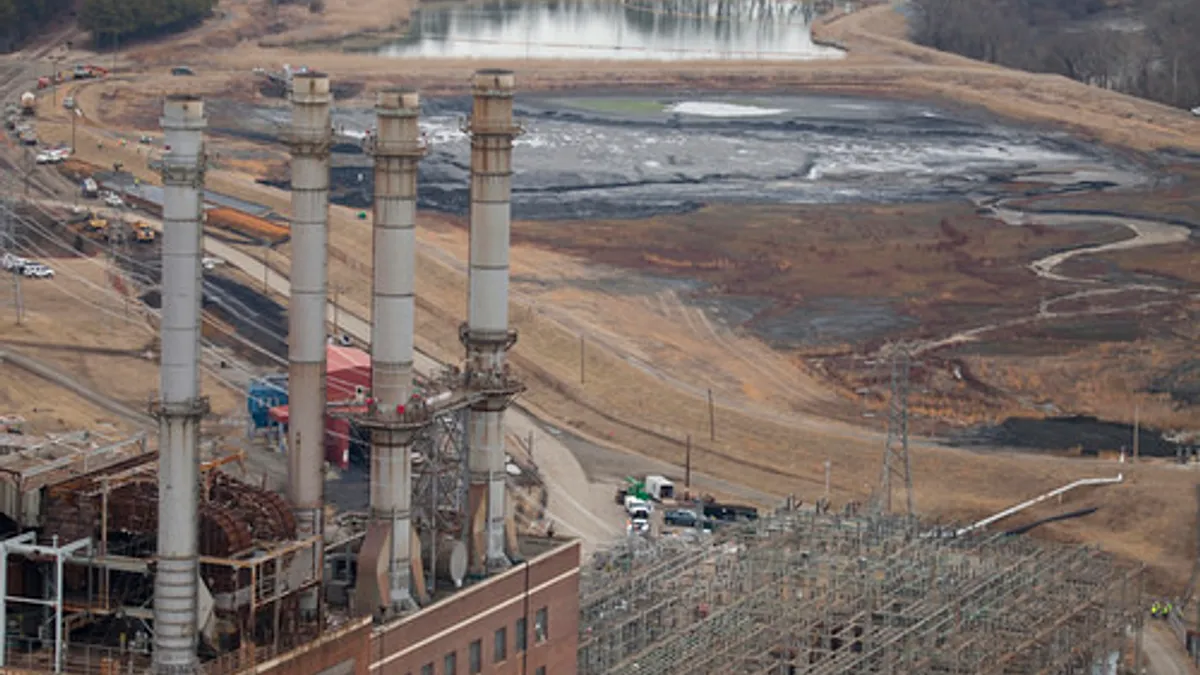Dive Brief:
-
The question of whether Duke Energy will earn a return on the largest coal ash cleanup in U.S. history is poised to be "a very big deal" for the utility, analysts and company executives say.
-
Duke is preparing to testify in front of North Carolina regulators Aug. 24, and will center its argument around the potential risks to its balance sheet if it is not able to earn a return on its projected $8-9 billion coal ash cleanup, mandated by a settlement reached with environmental groups in January. The North Carolina Utilities Commission (NCUC), in a separate January case, ruled Dominion Energy could not earn a return on its coal ash cleanup investments, which analysts say does not bode well for Duke.
- "If we were to receive an order consistent with Dominion ... absent any other provisions within the order that would be credit supportive, our balance sheet would be weakened," Duke Chairman, President and CEO Lynn Good said Monday during the company's second quarter earnings call. "I don't say this lightly, we don't want this outcome."
Dive Insight:
For years, Duke's highest-earning Carolinas subsidiary fought environmentalists on how it manages its coal ash. Groups argued the utility should excavate all of its coal ash ponds entirely — a fight heightened by a coal ash spill in 2014 that released tens of thousands of tons of coal ash into the nearby Dan River — while the utility insisted on leaving some facilities capped in place.
But the settlement reached at the beginning of this year will require the utility to excavate 80 million tons of waste, leaving the state with just one question — who will absorb the costs?
Duke received approval from the NCUC in 2018 to recover nearly all of its costs related to coal ash, but that ruling is currently being challenged in the state's Supreme Court by NCUC public staff and North Carolina Attorney General Josh Stein. Between the pending North Carolina Supreme Court case and an unfavorable ruling toward Dominion, analysts say the path forward for Duke is murky.
"We don't believe the more recent decision in Dominion's rate case bodes well for Duke," said Andrew Weisel, an analyst at Scotiabank. But "I would say what the Supreme Court does is actually going to be more impactful than what the regulators do," Weisel added.
"It's not clear what the difference is" between Duke's case and Dominion's case, and therefore unclear why regulators would rule differently on Duke than Dominion, said Paul Patterson, an analyst at Glenrock Associates.
Notably, "Dominion's North Carolina subsidiary is tiny compared to the combination of Duke Energy Progress and Duke Energy Carolinas," said Weisel, but "that may or may not matter."
Moody's Investors Service in May indicated that the inability of Duke to earn a return on its coal ash recovery efforts would ultimately be viewed as credit negative, a fact that would leave the utility's balance sheet "weakened," according to Good.
"Moody's has been very clear on the treatment of coal ash — if there's no return, it would be a direct reduction or deduction from" cash flow to debt, she said, adding the utility believes "there are no viable options to address" that finance issue. "It's too big to solve with equity issuances. It's too big to solve with operational responses."
The two things most likely to take a hit if the utility receives a negative ruling are its cash flow and customer affordability, said Weisel, adding it's a "very big deal" for both. Either Duke's earnings power goes down, which is bad for investors, or the utility has to add additional capital expenditures to maintain its earnings power, which puts pressure on customer bills, Weisel said.
"It's a big challenge for Duke to essentially find $8-9 billion of self-financing investments. Not to mention that's a big strain on the balance sheet," Weisel said. "So it would be a big financial challenge for both investors and customers if the company's unable to earn that return on the investment."
But opponents of Duke's ability to get a return on its coal ash recovery say the utility has been knowingly violating the Clean Water Act for years, and shouldn't be able to recover costs from customers for damages it knowingly caused. The utility in 2015 pled guilty to nine misdemeanors in federal court for violating the CWA by illegally discharging pollutants into nearby waterways through its coal ash ponds. Sierra Club, the attorney general and NCUC public staff argue the utility should not be allowed to make a profit off those actions at the expense of ratepayers.
"Duke has mishandled coal ash for decades and customers shouldn't be footing the bill for their bad business decisions," said David Rogers, southeast deputy regional director of the Sierra Club's Beyond Coal Campaign.















